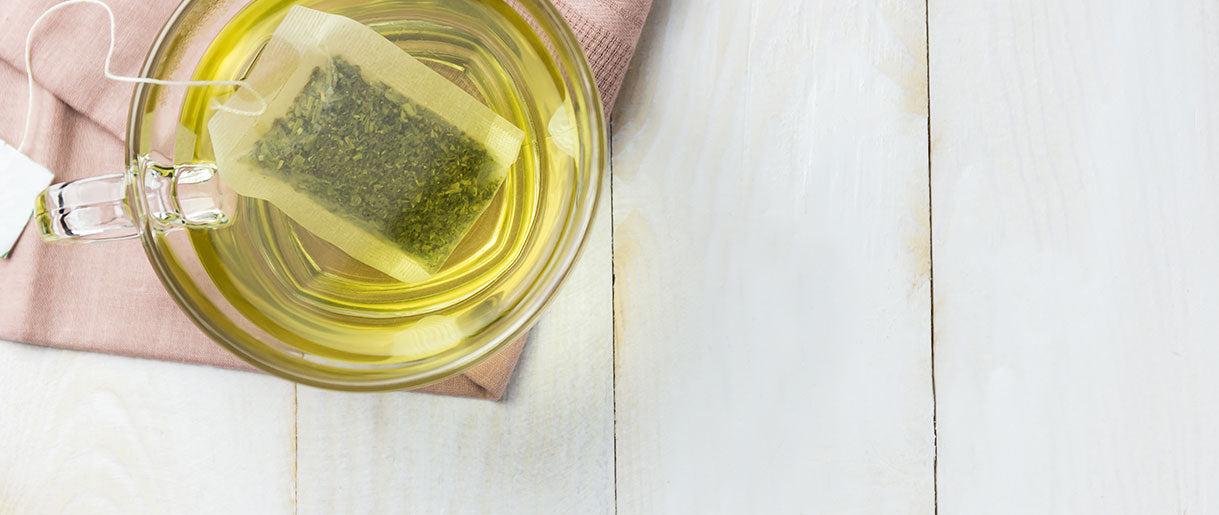Brain fog, that frustrating blend of confusion, forgetfulness, and lack of focus that clouds your mental landscape, can be highly annoying when you need to be productive. However, there's good news: L-Theanine, a calming amino acid found in green tea, is emerging as a champion in the battle against brain fog.
L-theanine promotes relaxation without drowsiness, enhancing alpha brain waves associated with a state of "alert calmness." This unique quality helps clear the mind, improve focus, and boost cognitive function—effectively cutting through the mental haze that holds you back.
In this article, we delve into the science of how L-Theanine targets brain fog, discussing its effects on neurotransmitters, stress reduction, and overall brain health.
1. Balances Neurotransmitters
Have you ever wondered how that cup of green tea seems to clear your mind? The secret lies in L-Theanine, a powerful component known for its ability to enhance brain function (1).
This remarkable amino acid balances neurotransmitters, essential for maintaining cognitive health and combating brain fog symptoms. Let's dive into how L-Theanine does this remarkable dance in our brains.
- Boosting GABA Levels: L-Theanine increases the production of GABA (2), a neurotransmitter that acts like a natural 'brake' for the brain, reducing anxiety and promoting relaxation. This helps to alleviate mental fog and support brain health, which is particularly important for those dealing with chronic fatigue syndrome.
- Enhancing Dopamine and Serotonin: These neurotransmitters are the brain's feel-good chemicals. L-Theanine helps to elevate their levels (3), enhancing mood and cognitive functions. This boost is vital for those experiencing cognitive decline or seeking improved cognitive function.
- Crossing the Blood-Brain Barrier: One of L-Theanine's superpowers is its ability to cross the blood-brain barrier easily (4). This means it can directly influence brain functions, making it an effective component in supplements for brain fog.
In the grand scheme of things, L-Theanine is not just a temporary fix; it's a component that can significantly improve mental clarity and cognitive performance.
By influencing key neurotransmitters and supporting alpha brain waves, L-Theanine is a natural ally in the fight against brain fog, offering a gentle yet effective approach to maintaining a sharp and focused mind.
2. Reduces Stress and Promotes Relaxation

In the hustle and bustle of modern life, stress and anxiety can often cloud our minds, causing brain fog symptoms and impacting our overall mental performance.
Enter L-Theanine, a natural ally in the quest for calmness. This amino acid, found in the serene leaves of green tea, holds the key to reducing stress and enhancing healthy cognitive function—this helps reduce brain fog symptoms.
- Calming the Nervous System: L-Theanine has a unique ability to relax the nervous system (5) without causing drowsiness. This makes it an excellent choice for those seeking to reduce stress and anxiety while maintaining alertness and focus.
- Alleviating Stress-Related Symptoms: Chronic stress can wreak havoc on our health and brain function. L-Theanine helps mitigate these effects by reducing stress-related symptoms (6), thereby supporting brain health and promoting a state of relaxed alertness.
- Benefits for Anxiety Disorders: For individuals with anxiety disorders, L-Theanine offers significant health benefits. Its effects on neurotransmitters help soothe the mind, reducing feelings of anxiety and improving mental clarity.
By tackling stress and anxiety, L-Theanine does more than just ease the mind; it clears the fog that often hampers our mental performance.
Its ability to reduce stress and support a healthy nervous system is a cornerstone in maintaining optimal brain health and cognitive function.
For this reason, most people confirm that the best time to take L-Theanine is when brain fog negatively affects their productive day.
3. Enhances Cognitive Functions
When it comes to sharpening the mind and reducing brain fog symptoms, L-Theanine stands out not just as a dietary supplement but as a cognitive enhancer backed by science.
This amino acid has shown promising results in enhancing various aspects of brain health, from focus and attention to memory, making it a compelling choice for those seeking to support healthy brain function.
- Boosting Focus and Attention: Especially relevant for individuals with attention deficit hyperactivity disorder (ADHD), L-Theanine has been observed to improve focus and attention. Its ability to modulate alpha brain waves enhances cognitive processing and helps maintain concentration over more extended periods—this is why some people use L-theanine for ADHD.
- Enhancing Working Memory: Working memory is crucial for day-to-day tasks and cognitive functions. Studies (7) suggest that the effects of L-theanine include improved working memory, aiding in better cognitive performance and reducing memory impairment.
- Comparison with Other Nootropics: Unlike some cognitive enhancers that can cause nutrient deficiencies or exacerbate underlying medical conditions, L-Theanine provides cognitive benefits without significant side effects. It works synergistically with other nutrients and supplements—for example, combining Ashwagandha and L-theanine—making it a safe and effective choice for cognitive improvement.
Research and cognitive tests have consistently shown the positive effects of L-theanine in cognitive enhancement. Whether tackling cognitive impairment or improving memory, L-Theanine's role in supporting brain health is undeniable.
4. Improves Sleep Quality

It's no secret that a good night's sleep is pivotal for maintaining optimal brain health, yet many of us struggle with sleep issues that lead to poor concentration and a sluggish reaction time.
This is where L-Theanine steps in, not just as a remedy but as a guardian of our sleep quality, directly impacting our fight against brain fog symptoms.
- The Sleep-Brain Fog Connection: Poor sleep quality is often a primary contributor to brain fog. It affects blood flow to the brain and disrupts cognitive functions (8), leading to a medical condition of persistent cloudiness in thought and focus. L-Theanine helps by improving sleep quality (9), ensuring the brain can rest and recover adequately.
- Improving Sleep Quality: L-theanine is known for enhancing relaxation without causing drowsiness. Promoting a calm state of mind aids in falling asleep more quickly and experiencing deeper, more restful sleep. This improvement in sleep quality is a critical factor in reducing brain fog symptoms.
- Impact on Clearer Thinking: The brain functions more efficiently with better sleep quality. L-Theanine's role in enhancing sleep directly translates to improved cognitive functions, such as clearer thinking and faster reaction times, essential in supporting overall brain health.
L-Theanine is a powerful ally in seeking better sleep and clearer thinkin. Addressing one of the root causes of brain fog—poor sleep quality—paves the way for improved cognitive functions and a healthier, more alert mind. This makes L-theanine one of the best supplements for brain fog.
How to Use L-Theanine for Brain Fog

When harnessing the brain health benefits of L-Theanine, especially for reducing brain fog symptoms, understanding the proper dosage and its various forms is critical. Whether you're reaching for a supplement or a cup of tea, getting the dose right can make all the difference.
- Recommended Dosages: Studies suggest a dosage range of 100-200 mg of L-Theanine per day for combating brain fog. This amount is generally considered safe and effective for most adults. However, it's always wise to start with a lower dose and see how your body responds, especially if you're also consuming caffeine.
- L-Theanine Supplements: In the form of dietary supplements, L-Theanine provides a straightforward way to achieve the desired dosage. These supplements are often available in capsule or tablet form, making monitoring and adjusting your intake easy.
- Tea and Other Natural Sources: Green tea is a natural source of L-Theanine, but the concentration can vary. A cup of green tea typically contains around 20-60 mg of L-Theanine. While tea is a great way to incorporate this amino acid into your diet, you might need several cups to reach the therapeutic levels for reducing brain fog.
Incorporating L-Theanine into your morning routine for mental health, whether through supplements or natural sources, can be a simple yet effective step in supporting your brain health.
Remember, it's not just about the quantity; the consistent, mindful consumption of L-Theanine helps clear the fog and sharpen your mind.
As always, consult a healthcare provider before starting any new supplement regimen, especially if you have existing health conditions or are taking other medications.
FAQs About L-Theanine Brain Fog
Does L-Theanine Help With Focus?
Yes, L-Theanine can help with focus.
It promotes relaxation without drowsiness and enhances alpha brain waves associated with alert and focused mental states. This makes L-theanine effective in improving concentration and attention.
When Is The Best Time To Take L-Theanine For Managing Brain Fog?
The best time to take L-Theanine for managing brain fog is typically in the morning or early afternoon. This timing helps enhance focus and clarity during the day without interfering with sleep patterns.
However, individual responses may vary, so it's advisable to adjust the timing based on personal experience.
Can L-Theanine Be Combined With Other Supplements Or Medications For Brain Fog Management?
L-Theanine can often be safely combined with other supplements or medications for brain fog management, as it's generally well-tolerated and non-sedative.
However, it's essential to consult a healthcare professional before combining it with other substances, especially if you are on prescribed medication, to avoid potential interactions.
Key Takeaways
In the journey through the misty realms of brain fog, L-Theanine emerges as a beacon of hope.
With its ability to enhance focus, improve sleep quality, and reduce stress, this remarkable amino acid is a testament to the power of natural supplements in supporting brain health.
Whether you're grappling with the haze of everyday stress or seeking a boost in cognitive function, L-Theanine offers a gentle yet effective path to clarity.
We invite you to share your experiences and thoughts. Have you tried L-Theanine for brain fog? What changes have you noticed?
Your insights enrich our conversation and help others navigate their paths to mental clarity. Leave a comment below and join the community striving for a clearer, brighter mind!
References
- Effects of l-Theanine on Cognitive Function in Middle-Aged and Older Subjects: A Randomized Placebo-Controlled Study, (1), https://www.ncbi.nlm.nih.gov/pmc/articles/PMC8080935/
- A Novel Theanine Complex, Mg-L-Theanine Improves Sleep Quality via Regulating Brain Electrochemical Activity, (2), https://www.frontiersin.org/articles/10.3389/fnut.2022.874254/full
- The neuropharmacology of L-theanine(N-ethyl-L-glutamine): a possible neuroprotective and cognitive enhancing agent, (3), https://pubmed.ncbi.nlm.nih.gov/17182482/
- l-Theanine protects against excess dopamine-induced neurotoxicity in the presence of astrocytes, (4), https://www.ncbi.nlm.nih.gov/pmc/articles/PMC5018574/
- Effects of L-Theanine Administration on Stress-Related Symptoms and Cognitive Functions in Healthy Adults: A Randomized Controlled Trial, (5), https://www.ncbi.nlm.nih.gov/pmc/articles/PMC6836118/
- How does the tea L-theanine buffer stress and anxiety, (6), https://www.sciencedirect.com/science/article/pii/S2213453021001324
- Effects of l-Theanine on Cognitive Function in Middle-Aged and Older Subjects: A Randomized Placebo-Controlled Study, (7), https://www.ncbi.nlm.nih.gov/pmc/articles/PMC8080935/
- The sleep-deprived human brain, (8), https://www.ncbi.nlm.nih.gov/pmc/articles/PMC6143346/
- In Search of a Safe Natural Sleep Aid, (9), https://pubmed.ncbi.nlm.nih.gov/25759004/










Let Us Know Your Comments